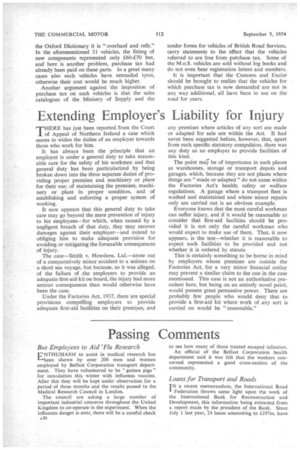Extending Employer's Liability for Injury
Page 32

If you've noticed an error in this article please click here to report it so we can fix it.
THERE has just been reported from the Court of Appeal of Northern Ireland a case which seems to widen the duties of an employer towards those who work for him.
It has always been the principle that an employer is under a general duty to take reasonable care for the safety of his workmen and that general duty has been particularized by being broken down into the three separate duties of providing proper premises and machinery or plant for their use; of maintaining the premises, machinery or plant in proper condition, and of establishing and enforcing a proper system of working.
It now appears that this general duty to take care may go beyond the mere prevention of injury to his employees—for which, when caused by a negligent breach of that duty, they may recover damages against their employer—and extend to obliging him to make adequate provision for avoiding or mitigating the-forseeable consequences of injury.
The case—Smith v. Howdens, Ltd.—arose out • of a comparatively minor accident to a seaman on a short sea voyage, but because, so it was alleged, of the failure of the employers to provide an adequate first-aid kit on board, the injury had more serious consequences than would otherwise have been the case.
Under the Factories Act, 1937, there are special provisions compelling employers to provide adequate first-aid facilities on their premilses, and any premises where articles of any sort are made or adapted for sale are within the Act. It had never been suggested before, however, that, apart from such specific statutory compulsion, there was any duty as an employer to provide facilities of this kind.
The point ma' be of importance in such places as warehouses, storage or transport depots and garages, which, because they are not places where things are" made or adapted" do not come within the Factories Act's health; safety or welfare regulations. A garage where a transport fleet is washed and maintained and where minor repairs only are carried out is an obvious example.
Everyone knows that the most careful workman can suffer injury, and if it would be reasonable to consider that first-aid facilities should be provided it is not only the careful workman who would expect to make use of them. That, it now appears, is the test—whether it is reasonable to expect such facilities to be provided and not whether it is ordered by statute.
This is certainly something to be borne in mind by employers whose premises are outside the Factories Act, for a very minor financial outlay may prevent a similar claim to the one in the case mentioned. This case is not an authoritative precedent here, but being on an entirely novel point, would possess great persuasive power. There are probably few people who would deny that to provide a first-aid kit where work of any sort is carried on would be "reasonable?'




































































































